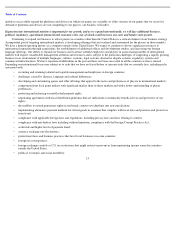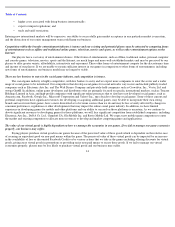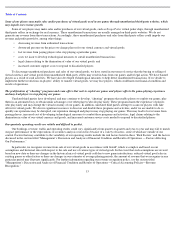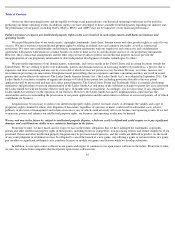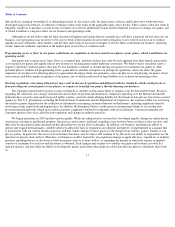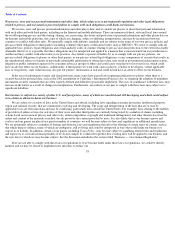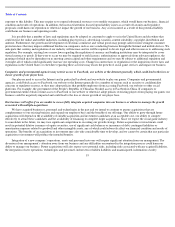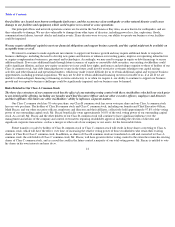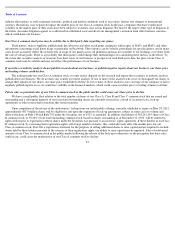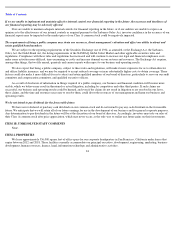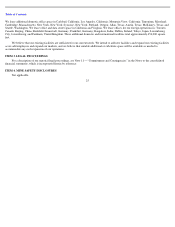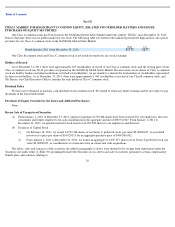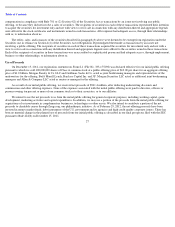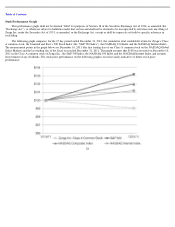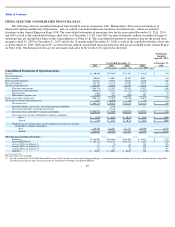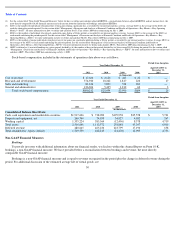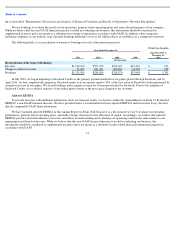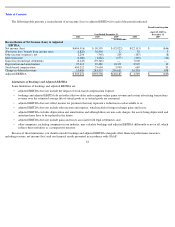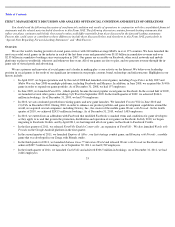Zynga 2011 Annual Report Download - page 27
Download and view the complete annual report
Please find page 27 of the 2011 Zynga annual report below. You can navigate through the pages in the report by either clicking on the pages listed below, or by using the keyword search tool below to find specific information within the annual report.
Table of Contents
industry fluctuations, as well as general economic, political and market conditions such as recessions, interest rate changes or international
currency fluctuations, may negatively impact the market price of our Class A common stock. In the past, companies that have experienced
volatility in the market price of their stock have been subject to securities class action litigation. We may be the target of this type of litigation in
the future. Securities litigation against us could result in substantial costs and divert our management’s attention from other business concerns,
which could harm our business.
Our Class A common stock price may be volatile due to third-party data regarding our games.
Third parties, such as AppData, publish daily data about us and other social game companies with respect to DAUs and MAUs and other
information concerning social game usage, in particular on Facebook. These metrics can be volatile, particularly for specific games, and in many
cases do not accurately reflect the actual levels of usage of our games across all platforms and may not correlate to our bookings or revenue from
the sale of virtual goods. There is a possibility that third parties could change their methodologies for calculating these metrics in the future. To
the extent that securities analysts or investors base their views of our business or prospects on such third-party data, the price of our Class A
common stock may be volatile and may not reflect the performance of our business.
If securities or industry analysts do not publish research about our business, or publish negative reports about our business, our share price
and trading volume could decline.
The trading market for our Class A common stock, to some extent, depends on the research and reports that securities or industry analysts
publish about our business. We do not have any control over these analysts. If one or more of the analysts who cover us downgrade our shares or
change their opinion of our shares, our share price would likely decline. If one or more of these analysts cease coverage of our company or fail to
regularly publish reports on us, we could lose visibility in the financial markets, which could cause our share price or trading volume to decline.
Future sales or potential sales of our Class A common stock in the public market could cause our share price to decline.
We have a small public float relative to the total number of shares of our Class A, Class B and Class C common stock that are issued and
outstanding and a substantial majority of our issued and outstanding shares are currently restricted as a result of securities laws, lock-up
agreements or other contractual restrictions that restrict transfers.
Upon completion of the release of the underwriters’
lockup from our initial public offering, currently scheduled to expire on May 28, 2012,
approximately 687.9 million shares will be eligible for sale upon the expiration of lock-up agreements, subject in some cases to volume and
other restrictions of Rule 144 and Rule 701 under the Securities Act of 1933, as amended. In addition, the holders of 363,241,145 shares of Class
B common stock, or 50.34% of our total outstanding common stock, based on shares outstanding as of December 31, 2011, will be entitled to
rights with respect to registration of these shares under the Securities Act pursuant to an investors’
rights agreement. If these holders of our Class
B common stock, by exercising their registration rights, sell a large number of shares, they could adversely affect the market price for our
Class A common stock. If we file a registration statement for the purposes of selling additional shares to raise capital and are required to include
shares held by these holders pursuant to the exercise of their registration rights, our ability to raise capital may be impaired. Sales of substantial
amounts of our Class A common stock in the public market following the release of the lock-up or otherwise, or the perception that these sales
could occur, could cause the market price of our Class A common stock to decline.
23


